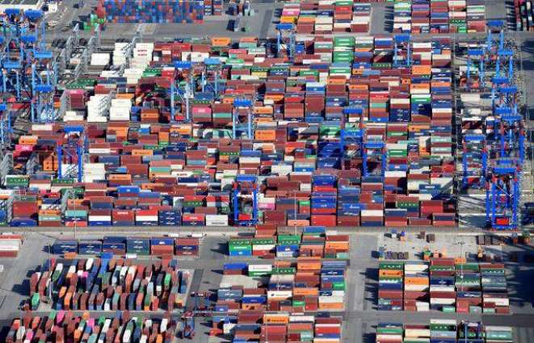FRANKFURT AM MAIN, Nov 8, 2019 (BSS/AFP) – German exports jumped higher than expected in September, outpacing imports to widen the country’s trade surplus in defiance of ongoing trade tensions and Brexit woes.
The trade surplus in Europe’s biggest economy grew to 19.2 billion euros ($21.2 billion) in September, up from 18.1 billion in August, the federal statistics office Destatis said in data adjusted for seasonal swings.
The “unexpected rebound in exports” at a time of slowing global growth and weak manufacturing data leaves observers “scratching their heads”, said ING Diba bank analyst Carsten Brzeski.
Some 114.2 billion euros of German goods were sold abroad in September, up 1.5 percent on the month before and a whopping 4.6 percent year-on-year, Destatis said.
Imports meanwhile climbed at a slightly slower pace to hit 93 billion euros, 1.3 percent higher month-on-month and an increase of 2.3 percent on the year.
Demand for “made in Germany” goods was driven by non-eurozone EU countries, with exports to the region rising seven percent.
The foreign trade data provided some relief for a country teetering on the brink of a recession after the German economy shrank by 0.1 percent in the second quarter.
Third-quarter figures are due on November 14.
“With today’s data, a technical recession is not yet a done deal,” Brzeski said, referring to two consecutive quarters of contraction.
But analyst Jens-Oliver Niklasch of LBBW cautioned against reading too much into the figures, saying September’s trade data could be an anomaly.
Looking at the first nine months of the year, he noted that exports to non-eurozone countries had actually fallen by 0.4 percent.
“That’s probably the Brexit effect,” he said, warning of further strain as the uncertainty surrounding Britain’s departure from the bloc drags on.
And although global trade conflicts have eased somewhat with hopes of a breakthrough in US-China talks, the risks “have not yet disappeared”, he added.
Germany’s export-oriented companies are particularly vulnerable to global trade upsets, and its automotive and industrial sectors have been hard hit in recent months.



